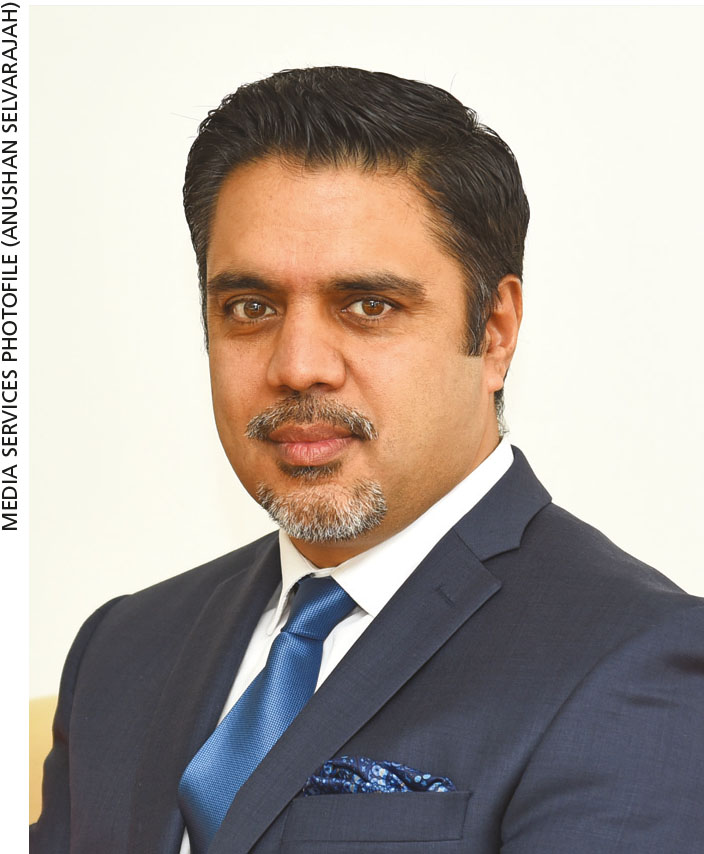DIPLOMATIC MISSION
Compiled by Savithri Rodrigo
IN DEFIANCE OF ALL ODDS
Ashraf Haidari highlights what’s required to move past conflict
Some months back, a delegation of Afghan female peace leaders visited Sri Lanka, announcing that women in Afghanistan are as engaged in national development as their male counterparts. And for a country that’s faced numerous challenges and been at the heart of global controversy – including its treatment of women – Afghanistan is more progressive than the world realises.
This is according to the Ambassador of the Islamic Republic of Afghanistan Ashraf Haidari, who asserts: “Women have come a long way since the fall of the Taliban, which unfortunately is what the world remembers. Today, women are fully present in our society, contributing to the economy and serving in leadership positions as ministers, deputy ministers and heads of mission in Washington, the UN and previously Norway, Indonesia and Switzerland.”
Afghanistan’s Ministry of Women’s Affairs promotes women’s empowerment and the nation boasts a female representation of 27 percent in parliament (which is higher than the US and Britain). The country’s constitution embeds equal rights for women and is said to have the freest media in the region with zero censorship.
“The delegation that visited Sri Lanka was keen to learn from Sri Lanka’s peace building experience, and how women can engage in the reconciliation and reintegration processes. We want to learn from Sri Lanka’s transition from war to peace including reintegration, and reconciliation initiatives and programmes, which have delivered tangible results,” Haidari says.
Having presented his credentials in November, he became the second Afghan ambassador to Sri Lanka since 2013 when the countries established direct bilateral ties. Haidari’s bonds with the island were cemented when as Deputy Chief of Mission in New Delhi, his work covered Sri Lanka.
The six decade relationship between Sri Lanka and Afghanistan – although intermittent due to conflict on both sides – was boosted by the countries’ presidents meeting often, which strengthened a friendship that has stood in good stead.
He elaborates: “Your vibrant and resilient democracy inspires younger democracies such as ours. I’m pleased by the steps both sides have taken to expand bilateral relations. This includes launching the Sri Lanka-Afghanistan Parliamentary Friendship Association, and eight agreements and MOUs signed since 2013 covering education, science, technology, the economy, sports, health and labour, as well as academic cooperation between Kabul University and the University of Colombo.”
To optimise advantages, Haidari says both countries should explore maritime security cooperation opportunities in counterterrorism, anti-narcotics and against human trafficking. “We need training and capacity building support in areas of mutual interest – especially sharing expertise in mine clearance, counterinsurgency and asymmetric warfare,” he says.
In addition, Haidari seeks to instigate business opportunities for Sri Lanka in the areas of skilled labour, agriculture and agribusiness, education, healthcare, construction, telecommunications, logistics and transportation, tea exports and design skills in gemmology.
“Sri Lanka is best positioned in the Indian Ocean for speedy development and must realise its vast potential to grow exponentially. It is already ahead of many countries in South Asia for social indicators and it’s only a matter of unleashing the potential to reach the top. This will come with good leadership,” he affirms.
A Senior Fellow of New America’s International Security programme in Washington D.C., Haidari publishes extensively and has been critical of fundamentalism of all hues. “We are devoutly religious but moderate and receptive to change,” he remarks.
Commenting on the destruction of the Bamyan Buddha statues, Haidari states that they stood tall, revered and protected in preceding centuries under Afghan empires, and espouses Islam as a faith of peace, coexistence and tolerance.
Regarding global geopolitics, he opines that while some dangerous threats are transnational by nature, others are regional: “But they symbiotically reinforce one another.”
He continues: “Therefore, when non-state actors tied up with regional entities and espoused competing conflicting geopolitical interests, Afghanistan became a battlefield, creating an enabling setup for transnational terrorist networks,” Haidari explains.
He observes that the past four decades have been particularly unkind to his peace and freedom loving people: “Despite the destructive conflicts imposed, we have persevered to survive and thrive.”
“The fall of the Taliban resulted in major strides towards sustainable peace, democracy and prosperity although not without sacrifices. It is in defiance of these complexities that our developing democracy held its fourth presidential election last year with many Afghans casting their ballot despite terrorist threats and attacks,” he adds.
And he observes that regional economic integration is the only option to address longstanding or protracted interstate tensions in South Asia.
Haidari explains that “while SAARC can be the catalyst for sustainable development in South Asia, such efforts are hindered due to hostilities between two member states. Confrontational policies at the regional level must be replaced with cooperative win-win partnerships to gradually minimise existing interstate tensions.”
“South Asia is a young and naturally endowed region. A secure future for youth in a common interdependent neighbourhood can only be offered if we learn relevant lessons from pre and postwar Europe whereby tough but necessary policy choices are made against the status quo to achieve peace and prosperity,” he concludes.







